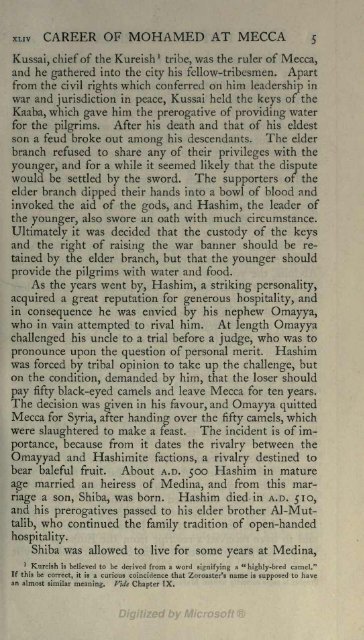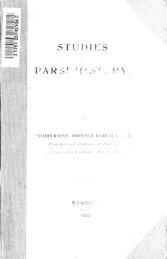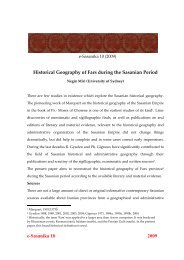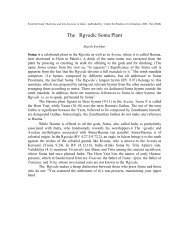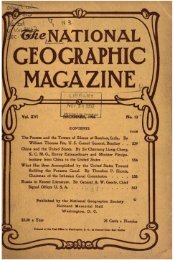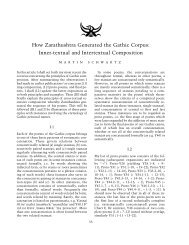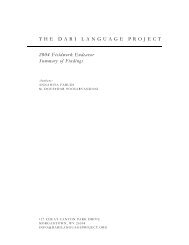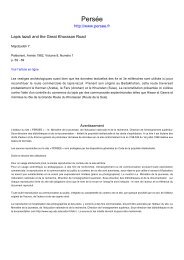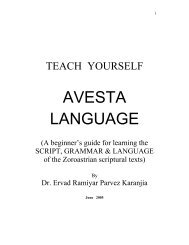- Page 6 and 7: MACMILLAN AND CO., LONDON BOMBAY CA
- Page 8: (Through the courtesy of Doctor Ahm
- Page 11 and 12: A HISTORY OF PERSIA BY LIEUT. -CoL.
- Page 13 and 14: -v'l PART OF A PERSIAN HUNTING SCEN
- Page 15 and 16: -. CONTENTS Khorasan under the Cali
- Page 17 and 18: CONTENTS ix CHAPTER LV PAGE THE MON
- Page 19 and 20: CONTENTS xi CHAPTER LXI LITERATURE
- Page 21 and 22: CONTENTS xiii CHAPTER LXVIII PAGE T
- Page 23 and 24: CONTENTS xv CHAPTER LXXIV THE FOUND
- Page 25: CONTENTS xvii CHAPTER ..... LXXX PA
- Page 28 and 29: xx HISTORY OF PERSIA FACE PAGE . .
- Page 30 and 31: MOHAMED SHAYBANI. MAPS VOL. To illu
- Page 33 and 34: THI-; OPENING SURA OF THE KORAN. CH
- Page 35 and 36: XLIV CAREER OF MOHAMED AT MECCA 3 r
- Page 37: THE KA.MJ.V (From a Persian MS. in
- Page 41 and 42: XLIV CAREER OF MOHAMED AT MECCA 7 w
- Page 43 and 44: xi.iv CAREER OF MOHAMED AT MECCA 9
- Page 47 and 48: CAREER OF MOHAMED AT MECCA n Recite
- Page 51 and 52: QUOTATION FROM THE KORAN. (From a M
- Page 55 and 56: THE ESTABLISHMENT OF ISLAM 15 be aw
- Page 57 and 58: XLV THE ESTABLISHMENT OF ISLAM 17 p
- Page 59 and 60: XLV THE ESTABLISHMENT OF ISLAM 19 w
- Page 61 and 62: THE ESTABLISHMENT OF ISLAM 21 lost
- Page 63 and 64: -.. THE ESTABLISHMENT OF ISLAM 23 a
- Page 65 and 66: Father of Hasan, Father of Dust, Th
- Page 67 and 68: XLVI ISLAM UNDER FIRST FOUR CALIPHS
- Page 69 and 70: XLVI ISLAM UNDER FIRST FOUR CALIPHS
- Page 71 and 72: ISLAM UNDER FIRST FOUR CALIPHS 31 e
- Page 73 and 74: XLVI ISLAM UNDER FIRST FOUR CALIPHS
- Page 75 and 76: XLVI ISLAM UNDER FIRST FOUR CALIPHS
- Page 77: 1 * 8 1
- Page 80 and 81: 38 HISTORY OF PERSIA CHAP. and in o
- Page 82 and 83: 40 HISTORY OF PERSIA terms for them
- Page 84: 42 HISTORY OF PERSIA CHAP. progress
- Page 88 and 89:
44 HISTORY OF PERSIA century of our
- Page 91 and 92:
THE TRAGEDY OF KERBELA 45 he served
- Page 93 and 94:
OMAYYAD DIRHEM. CHAPTER XLVIII PERS
- Page 95 and 96:
XLVIII THE OMAYYAD CALIPHATE 49 Con
- Page 97 and 98:
XLVIII THE OMAYYAD CALIPHATE 51 as
- Page 99 and 100:
(e XLVIII THE OMAYYAD CALIPHATE 53
- Page 103 and 104:
THE OMAYYAD CALIPHATE 55 Khorasan u
- Page 105 and 106:
XLVIII THE OMAYYAD CALIPHATE 57 Wel
- Page 107 and 108:
THE OMAYYAD CALIPHATE 59 taken, and
- Page 109 and 110:
l ABU MUSLIM. CHAPTER XLIX PERSIAN
- Page 112 and 113:
H\ >-'Su.a iyah^ THE PROVINCES OF T
- Page 115 and 116:
XLIX THE EARLY ABBASID PERIOD 63 an
- Page 119 and 120:
THE EARLY ABBASID PERIOD 65 Lord, h
- Page 121 and 122:
THE EARLY ABBAS1D PERIOD 67 inciden
- Page 123 and 124:
CHAP. i. THE GOLDEN AGE OF ISLAM 69
- Page 125 and 126:
L THE GOLDEN AGE OF ISLAM 71 same d
- Page 129 and 130:
I THE GOLDEN AGE OF ISLAM 73 Merv t
- Page 133 and 134:
THE GOLDEN AGE OF ISLAM 75 All men
- Page 135 and 136:
THE GOLDEN AGE OF ISLAM 77 entirely
- Page 137 and 138:
THE GOLDEN AGE OF ISLAM 79 complain
- Page 139 and 140:
THE GOLDEN AGE OF ISLAM 81 " to enc
- Page 141 and 142:
CHAP. LI DECAY OF THE CALIPHATE 83
- Page 144 and 145:
EnaUah- Statute Miles o too zoo 300
- Page 147:
A, I/
- Page 150 and 151:
86 HISTORY OF PERSIA been a passive
- Page 152 and 153:
88 HISTORY OF PERSIA Chubin. Being
- Page 154 and 155:
9o HISTORY OF PERSIA CHAP. of Amr i
- Page 156 and 157:
92 HISTORY OF PERSIA The Ziyarid Dy
- Page 159 and 160:
DECAY OF THE CALIPHATE 93 of brickw
- Page 161 and 162:
DECAY OF THE CALIPHATE 95 salaries,
- Page 163 and 164:
DECAY OF THE CALIPHATE 97 A Persian
- Page 165 and 166:
THE SELJUK TURKS 99 of jelj uk, who
- Page 167:
2 H
- Page 170 and 171:
102 HISTORY OF PERSIA ances, and se
- Page 172 and 173:
io 4 HISTORY OF PERSIA CHAP. throug
- Page 174 and 175:
106 HISTORY OF PERSIA CHAP. The pow
- Page 176 and 177:
io8 HISTORY OF PERSIA CHAP. There w
- Page 178 and 179:
no HISTORY OF PERSIA were brought i
- Page 180 and 181:
. ,.,,,. ii2 HISTORY OF PERSIA CHAP
- Page 182 and 183:
1 1 4 HISTORY OF PERSIA CHAP. able
- Page 184 and 185:
n6 HISTORY OF PERSIA CHAP. remnant
- Page 186 and 187:
ALP ARSLAN. CHAPTER L11I THE DISRUP
- Page 188 and 189:
120 HISTORY OF PERSIA CHAP. hundred
- Page 190 and 191:
122 HISTORY OF PERSIA CHAP. which h
- Page 192 and 193:
i2 4 HISTORY OF PERSIA CHAP. vince
- Page 195 and 196:
LIU DISRUPTION OF SELJUK EMPIRE 125
- Page 199 and 200:
DISRUPTION OF SELJUK EMPIRE 127 tio
- Page 201 and 202:
LIU DISRUPTION OF SELJUK EMPIRE 129
- Page 203 and 204:
CHAP. LIV PERSIAN LITERATURE 131 th
- Page 205 and 206:
LIV PERSIAN LITERATURE 133 Al-Birun
- Page 207:
&** THE SITE OF FIRDAUSI'S TOMB. Fr
- Page 210:
136 HISTORY OF PERSIA CHAP. shore,
- Page 214:
138 HISTORY OF PERSIA CHAP. occasio
- Page 218 and 219:
1 40 HISTORY OF PERSIA lips to rubi
- Page 221 and 222:
PERSIAN LITERATURE 141 Nizami. A ve
- Page 223 and 224:
PERSIAN LITERATURE 143 to be critic
- Page 225 and 226:
THE MONGOL CATACLYSM 145 from this
- Page 227:
.' A NOMAD OF THE PERIOD OF CHENGHI
- Page 230 and 231:
148 HISTORY OF PERSIA CHAP. This pr
- Page 233 and 234:
. THE MONGOL CATACLYSM 149 the son
- Page 235 and 236:
THE MONGOL CATACLYSM 151 Juji, the
- Page 237 and 238:
LV THE MONGOL CATACLYSM 153 Meanwhi
- Page 239 and 240:
THE MONGOL CATACLYSM 155 were massa
- Page 241 and 242:
LV THE MONGOL CATACLYSM 157 under S
- Page 243 and 244:
LV THE MONGOL CATACLYSM 159 expecta
- Page 245 and 246:
THE MONGOL CATACLYSM 161 Before he
- Page 247 and 248:
(H...VI EXTINCTION OF THE CALIPHATE
- Page 249 and 250:
EXTINCTION OF THE CALIPHATE 165 tre
- Page 251 and 252:
LVI EXTINCTION OF THE CALIPHATE 167
- Page 253 and 254:
EXTINCTION OF THE CALIPHATE 169 Joh
- Page 255:
\nt>
- Page 258 and 259:
172 HISTORY OF PERSIA CHAP. succeed
- Page 260 and 261:
174 HISTORY OF PERSIA enshrined in
- Page 263 and 264:
? EXTINCTION OF THE CALIPHATE 175 y
- Page 265 and 266:
1 I fll CHAPTER LVII THE HEATHEN IL
- Page 267 and 268:
HEATHEN IL-KHANS OF PERSIA 179 fled
- Page 269 and 270:
... HEATHEN IL-KHANS OF PERSIA 181
- Page 273 and 274:
HEATHEN IL-KHANS OF PERSIA 183 in P
- Page 275 and 276:
HEATHEN IL-KHANS OF PERSIA 185 succ
- Page 277 and 278:
LVII HEATHEN IL-KHANS OF PERSIA 187
- Page 279 and 280:
CHAP. LVIII GHAZAN KHAN 189 His Fir
- Page 281:
flo !;$5gSBr IV
- Page 284 and 285:
1 92 HISTORY OF PERSIA and villages
- Page 286:
i 94 HISTORY OF PERSIA had married
- Page 290 and 291:
1 The authorities for this chapter
- Page 292 and 293:
198 HISTORY OF PERSIA His Birth in
- Page 295 and 296:
f TAMERLANE 199 treachery, and they
- Page 297 and 298:
i (1369-1380). ! 782 - TAMERLANE 20
- Page 301 and 302:
TAMERLANK 203 upon the summit of th
- Page 303 and 304:
LIX TAMERLANE 205 residence and the
- Page 305 and 306:
TAMERLANE 207 doom of the Muzaffar
- Page 307 and 308:
TAMERLANE 209 in the stricken field
- Page 311 and 312:
MX TAMERLANE 211 " ornamented very
- Page 313:
AT THE DOOR OF TAMERLANE'S TOMB. (F
- Page 316 and 317:
2i 4 HISTORY OF PERSIA proposed the
- Page 319 and 320:
LIX TAMERLANE 215 and in an absolut
- Page 321 and 322:
CH...X THE TIMURID MONARCHS 217 the
- Page 323:
A SORTIE FROM SAMAKCAND. (From the
- Page 326:
220 HISTORY OF PERSIA The "Black Sh
- Page 330 and 331:
222 HISTORY OF PERSIA Nicolo Crespo
- Page 333 and 334:
THE TIMURID MONARCHS 223 Buher. No
- Page 335 and 336:
THE "DIWAN" OF JALAL-U-DIN, RUMI. (
- Page 337 and 338:
I.XI LITERATURE UNDER MONGOLS 227 n
- Page 339 and 340:
LITERATURE UNDER MONGOLS 229 the Ko
- Page 341 and 342:
LXI LITERATURE UNDER MONGOLS 231 he
- Page 345 and 346:
LITERATURE UNDER MONGOLS 233 The hi
- Page 347 and 348:
LXI ARCHITECTURE UNDER MONGOLS 235
- Page 351 and 352:
LXI ARCHITECTURE UNDER MONGOLS 237
- Page 355 and 356:
ARCHITECTURE UNDER MONGOLS 239 supp
- Page 357 and 358:
CH.LXH RISE OF THE SAFAVI DYNASTY 2
- Page 359 and 360:
RISE OF THE SAFAVI DYNASTY 243 rapi
- Page 363 and 364:
LXII RISE OF THE SAFAVI DYNASTY 245
- Page 367 and 368:
LX,I RISE OF THE SAFAVI DYNASTY 247
- Page 369:
. ' 3
- Page 372 and 373:
2 50 HISTORY OF PERSIA Jenkinson, a
- Page 374 and 375:
2 52 HISTORY OF PERSIA to repair an
- Page 376 and 377:
254 HISTORY OF PERSIA CHAP. of the
- Page 378 and 379:
HOLOGRAPH DOCUMENT SIGNED BY SHAH A
- Page 380 and 381:
f, 258 HISTORY OF PERSIA CHAP. owin
- Page 383 and 384:
SHAH ABBAS THE GREAT 259 the throne
- Page 385 and 386:
. SHAH ABBAS THE GREAT 261 declared
- Page 387 and 388:
SHAH ABBAS THE GREAT 263 his was th
- Page 389 and 390:
SHAH ABBAS THE GREAT 265 Cotton, to
- Page 391 and 392:
SHAH ABBAS THE GREAT 267 that he dr
- Page 393 and 394:
: SHAH SUI.AYMAN. CHAPTER LXIV THE
- Page 395 and 396:
STRUGGLE IN THE PERSIAN GULF 271 wa
- Page 399 and 400:
i.xiv STRUGGLE IN THE PERSIAN GULF
- Page 401 and 402:
STRUGGLE IN THE PERSIAN GULF 275 bo
- Page 403 and 404:
LXIV STRUGGLE IN THE PERSIAN GULF 2
- Page 405 and 406:
' STRUGGLE IN THE PERSIAN GULF 279
- Page 409 and 410:
i.xiv STRUGGLE IN THE PERSIAN GULF
- Page 411:
~ ' : , < r c^ c H 5
- Page 414 and 415:
CHAPTER LXV ARCHITECTURE AND ART UN
- Page 416:
286 HISTORY OF PERSIA CHAP. Persia,
- Page 422:
288 HISTORY OF PERSIA CHAP. Khan, w
- Page 426 and 427:
2 90 HISTORY OF PERSIA and transluc
- Page 428 and 429:
Ui \ip^fcffiia^iiai-iB^ ->_ _ J^\I
- Page 430 and 431:
wfUr^ . HinSffiiiagf W:% . u ; m
- Page 432:
292 HISTORY OF PERSIA nomad tribe w
- Page 436 and 437:
294 HISTORY OF PERSIA produce an ef
- Page 439 and 440:
ILXV v:~ ARCHITECTURE AND ART 295 T
- Page 441 and 442:
. n. , xvi DECLINE OF SAFAVI DYNAST
- Page 445 and 446:
were cut down. DECLINE OF SAFAVI DY
- Page 447:
'
- Page 450:
302 HISTORY OF PERSIA CHAP. vingt p
- Page 454 and 455:
3 o 4 HISTORY OF PERSIA of the Imam
- Page 456 and 457:
306 HISTORY OF PERSIA the Cape of G
- Page 458 and 459:
308 HISTORY OF PERSIA Mir Vais. Gur
- Page 460 and 461:
3 io HISTORY OF PERSIA assembled a
- Page 462 and 463:
SHAH HUSAYN. CHAPTER LXVIII THE OVE
- Page 464 and 465:
3 1 4 HISTORY OF PERSIA Mahmud left
- Page 466:
316 HISTORY OF PERSIA The Capture o
- Page 470:
i 3 8 HISTORY OF PERSIA and proceed
- Page 474 and 475:
320 HISTORY OF PERSIA force, and Tu
- Page 476 and 477:
322 HISTORY OF PERSIA CHAP. disloya
- Page 478 and 479:
3 24 HISTORY OF PERSIA vinces occup
- Page 480:
326 HISTORY OF PERSIA also by the f
- Page 484 and 485:
328 HISTORY OF PERSIA CHAP. muftiy
- Page 487 and 488:
LXIX EXPULSION OF THE AFGHANS 329 d
- Page 489 and 490:
- EXPULSION OF THE AFGHANS 331 orde
- Page 491 and 492:
EXPULSION OF THE AFGHANS 333 of Meh
- Page 493 and 494:
KXPULSION OF THE AFGHANS 335 failed
- Page 495 and 496:
EXPULSION OF THE AFGHANS 337 India.
- Page 497 and 498:
NADIR SHAH. CHAPTER LXX THE RISE OF
- Page 501 and 502:
RISE OF NADIR KULI 341 that he shou
- Page 503:
out ti JfottfrmfA l-y tlie A < \ ri
- Page 506 and 507:
344 HISTORY OF PERSIA CHAP. He wrot
- Page 508 and 509:
346 HISTORY OF PERSIA CHAP. retired
- Page 511 and 512:
RISE OF NADIR KUIJ 347 out his sche
- Page 513:
: I
- Page 516 and 517:
350 HISTORY OF PERSIA years previou
- Page 519 and 520:
: CONQUESTS OF NADIR SHAH 351 posit
- Page 521 and 522:
CONQUESTS OF NADIR SHAH 353 The boo
- Page 523:
?. s 2 I
- Page 526 and 527:
356 HISTORY OF PERSIA CHAP. second
- Page 528 and 529:
358 HISTORY OF PERSIA they were for
- Page 531 and 532:
CONQUESTS OF NADIR SHAH 359 of the
- Page 533 and 534:
CH. LXXII LAST YEARS OF NADIR SHAH
- Page 535 and 536:
LXXII LAST YEARS OF NADIR SHAH 363
- Page 537:
JONAS HANWAY AND THE COLUMNS OF SKU
- Page 540 and 541:
366 HISTORY OF PERSIA CHAP. restitu
- Page 542 and 543:
368 HISTORY OF PERSIA CHAP. difficu
- Page 544 and 545:
KARIM KHAN. CHAPTER LXXIII THE SHOR
- Page 546 and 547:
372 HISTORY OF PERSIA defeated and
- Page 549 and 550:
SHORT-LIVED ZAND DYNASTY 373 Prince
- Page 551:
KAKIM KUAN. /\\I>. Yom ;ui fngravin
- Page 554:
376 HISTORY OF PERSIA conduct. Than
- Page 558 and 559:
378 HISTORY OF PERSIA but the momen
- Page 560 and 561:
380 HISTORY OF PERSIA CHAP. campaig
- Page 563 and 564:
LZXIII SHORT-LIVED ZAND DYNASTY 38
- Page 567 and 568:
SHORT-LIVED ZAND DYNASTY 383 adhere
- Page 569 and 570:
AGA MOHAMKD SHAH. CHAPTER LXX1V THE
- Page 571 and 572:
FOUNDING OF KAJAR DYNASTY 387 some
- Page 575 and 576:
FOUNDING OF KAJAK DYNASTY 389 Georg
- Page 577:
a photograph Av .Major /. //". \\'
- Page 580 and 581:
392 HISTORY OF PERSIA clearly that
- Page 583 and 584:
I.XXIY FOUNDING OF KAJAR DYNASTY 39
- Page 585 and 586:
FATII AI.I SHAH. CHAPTER LXXV BRITI
- Page 587 and 588:
LXXV BRITISH AND FRENCH MISSIONS 39
- Page 589:
:" I-AI II AI.I SHAH. (From ;i Pers
- Page 592 and 593:
400 HISTORY OF PERSIA new situation
- Page 594 and 595:
-! fa " 402 HISTORY! OF PERSIA CHAP
- Page 596 and 597:
4 o 4 HISTORY OF PERSIA Mahmud Shah
- Page 598 and 599:
406 HISTORY OF PERSIA tested. It is
- Page 600 and 601:
4o8 HISTORY OF PERSIA CHAP. defensi
- Page 602 and 603:
FATH An SHAH. CHAPTER LXXVI THE DIS
- Page 604 and 605:
4 i2 HISTORY OF PERSIA CHAP. presen
- Page 607 and 608:
: DISASTROUS CAMPAIGNS surrender, b
- Page 609 and 610:
DISASTROUS CAMPAIGNS 415 up u squar
- Page 611:
I'rciiii CHRISTIAN TRIBKSMKN IN KUR
- Page 614 and 615:
i 4 8 HISTORY OF PERSIA Russian mai
- Page 616 and 617:
420 HISTORY OF PERSIA CHAP. provinc
- Page 618 and 619:
422 HISTORY OF PERSIA CHA fortunate
- Page 620 and 621:
4 2 4 HISTORY OF PERSIA CHAP. order
- Page 622 and 623:
426 HISTORY OF PERSIA was a heavy b
- Page 624:
428 HISTORY OF PERSIA Zil-u- Sultan
- Page 628 and 629:
430 HISTORY OF PERSIA own scanty ed
- Page 630:
3S 432 HISTORY OF PERSIA CHAP. agai
- Page 634 and 635:
434 HISTORY OF PERSIA CHAP. was cap
- Page 636 and 637:
436 HISTORY OF PERSIA CHAP. an expe
- Page 638 and 639:
438 HISTORY OF PERSIA CHAP. British
- Page 640 and 641:
440 HISTORY OF PERSIA CHAP. LXXVH i
- Page 642 and 643:
442 HISTORY OF PERSIA CHAP. afterwa
- Page 644 and 645:
444 HISTORY OF PERSIA CHAP. twenty-
- Page 647 and 648:
: ' THE PERSO-AFGHAN QUESTION 445 m
- Page 649:
l-'i;>nt it /' .\nnri. I'.AHA.
- Page 652 and 653:
448 HISTORY OF PERSIA CHAP. in chec
- Page 654 and 655:
450 HISTORY OF PERSIA be deducted f
- Page 656 and 657:
452 HISTORY OF PERSIA CHAP. by his
- Page 658:
454 HISTORY OF PERSIA day was actua
- Page 662 and 663:
456 HISTORY OF PERSIA Khanikoff, in
- Page 664 and 665:
NASIR-U-DIN SHAH. CHAPTER LXXIX THE
- Page 666 and 667:
I 460 HISTORY OF PERSIA snow, and P
- Page 668 and 669:
462 HISTORY OF PERSIA Chikishliar,
- Page 670:
464 HISTORY OF PERSIA CHAP. The fin
- Page 674:
466 HISTORY OF PERSIA state of Kala
- Page 678:
468 HISTORY OF PERSIA In his award
- Page 682 and 683:
470 HISTORY OF PERSIA the boundarie
- Page 684 and 685:
THE SIGNATURE OF NASIR-U-DIN SHAH K
- Page 686 and 687:
474 HISTORY OF PERSIA In 1872 a thi
- Page 688 and 689:
476 HISTORY OF PERSIA return, the C
- Page 691 and 692:
THE AWAKENING OF PERSIA 477 jealous
- Page 693 and 694:
THE AWAKENING OF PERSIA 479 auspici
- Page 695 and 696:
THE AWAKENING OF PERSIA 481 out tha
- Page 697 and 698:
THE AWAKENING OF PERSIA 483 To-day
- Page 699:
KURD BOY HL'RMNd RUE TO AVK.RT THK
- Page 702 and 703:
486 HISTORY OF PERSIA and Russia be
- Page 704:
4 88 HISTORY OF PERSIA CHAP. public
- Page 708 and 709:
490 HISTORY OF PERSIA be farmed out
- Page 710:
492 HISTORY OF PERSIA CHAP. When co
- Page 714 and 715:
494 HISTORY OF PERSIA CHAP. about 5
- Page 716:
496 HISTORY OF PERSIA CHAP. For thi
- Page 720 and 721:
498 HISTORY OF PERSIA peasants can
- Page 722 and 723:
MuZAFFAR-U-DlN. CHAPTER LXXXII THE
- Page 724 and 725:
502 HISTORY OF PERSIA more dangerou
- Page 726 and 727:
504 HISTORY OF PERSIA Khan, who rep
- Page 729 and 730:
GRANTING OF A CONSTITUTION 505 daug
- Page 731 and 732:
GRANTING OF A CONSTITUTION 507 inte
- Page 733:
'nun a filiotograpk by Col. H. A. S
- Page 736 and 737:
5 io HISTORY OF PERSIA short, witho
- Page 739 and 740:
HAROUN-AL-RASHIU. LIST OF AUTHORITI
- Page 741 and 742:
LIST OF AUTHORITIES 515 General Ske
- Page 743 and 744:
LIST OF AUTHORITIES 517 Original Le
- Page 745 and 746:
MUZAKFARID, SHAH SHUJA. INDEX Abade
- Page 747 and 748:
INDEX 521 277 j capture of Babylon
- Page 749 and 750:
INDEX 5 2 3 Antony, Mark ; early ca
- Page 751 and 752:
INDEX 5 2 5 Athanasius, 1. 465 Athe
- Page 753 and 754:
INDEX 527 Beciuins, the, i. 531 ; i
- Page 755 and 756:
INDEX 529 Charles I. (of England),
- Page 757 and 758:
INDEX 487, 488, 491,494, 516, 519 ;
- Page 759 and 760:
INDEX 533 Euloeus, River, i. 43 Eum
- Page 761 and 762:
INDEX 535 Gulistan, Treaty of, ii.
- Page 763 and 764:
INDEX 537 Hormazd, vide Hormisdns I
- Page 765 and 766:
INDEX 539 ii. 58 Jajarm, city of, i
- Page 767 and 768:
INDEX Khalludush, King of Elam, i.
- Page 769 and 770:
Leonidas, i. 213, 214 footnote, 343
- Page 771 and 772:
INDEX 545 Mazanderan, province of,
- Page 773 and 774:
INDEX 547 Muir, Sir William, i. 506
- Page 775 and 776:
INDKX 549 ii. 144, 151, 153, 154, 1
- Page 777 and 778:
INDEX 55 1 defeated by Cyrus, 152-1
- Page 779 and 780:
INDEX 553 246 et seq. ; Sulayman th
- Page 781 and 782:
footnote Punic Wars 5 First, i. 339
- Page 783 and 784:
INDEX 557 Sainsbury, Noel, ii. 273
- Page 785 and 786:
INDEX 559 Selim I., 245 ; 246 ; abo
- Page 787 and 788:
INDEX 561 Taki Khan, governor of Pa
- Page 789 and 790:
INDEX 563 refugees, ; 328 ; conques
- Page 791:
INDKX Zadracarta, the capital of Hy
- Page 794:
A SELECTION OF WORKS ON TRAVEL AND


